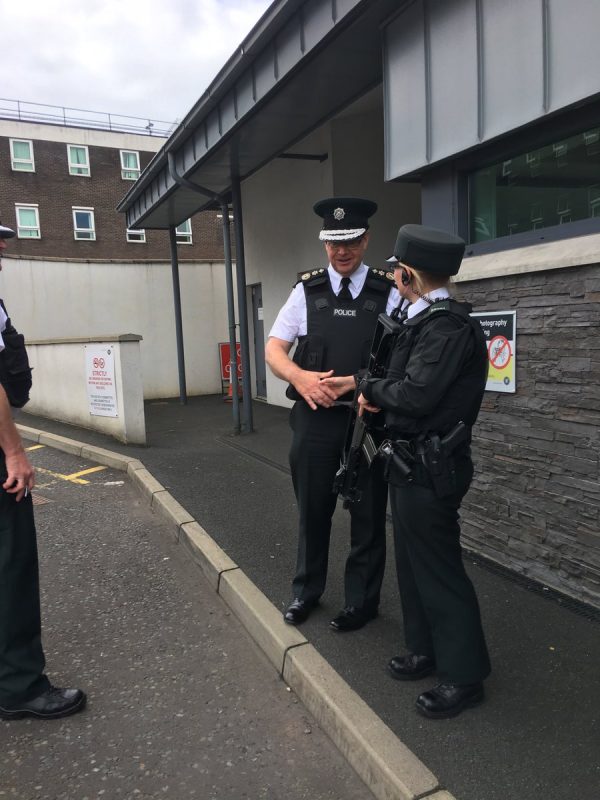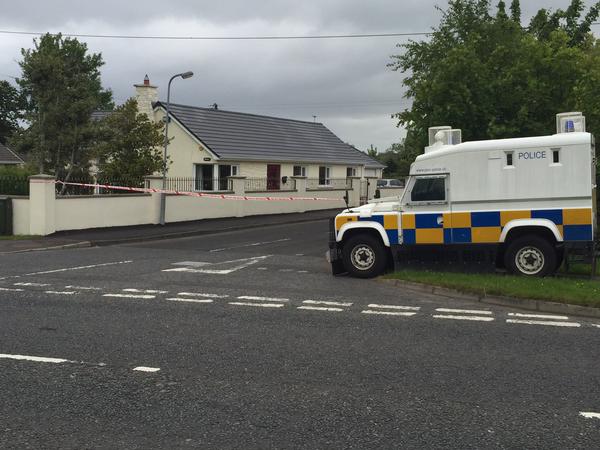
Chief Constable Simon Byrne on a recent visit to Strand Road police station to meet officers
Mr Byrne said he believed people in Creggan wanted more police officers in the area to deal with issues such as drugs, burglary and anti-social behaviour.
He made the remarks during an update on policing to the Northern Ireland Affairs Committee at Westminster.
The Chief Constable was responding to a question from Conservative MP Desmond Swayne asked him if Creggan was out of bounds for his personnel.
Mr Swayne said: “There was a BBC report in July about Creggan, where there had been signs posted warning people not to inform.
“The general consensus was that the people living on the estate did not much care for it, but simply had to accept it as reality.
“Are there no-go areas for the PSNI and, if so, where are they and what are the implications?”
Mr. Byrne replied: “I would not countenance the prospect of there being any no-go areas across NI.
“Some of you have been to see the policing, where there are some pretty difficult places to police, because of the security situation, particularly in the border areas.

Command wire improvised explosive device found by police in Creggan Heights last month
“We patrol in and out of there every day; we go in on foot and on bikes and we patrol by car.”
He said people living in Creggan wanted a visible police presence on the streets.
“Sometimes, we have to carefully consider the policing stance based on intelligence.
“But what I hear from frontline officers is that, even back to those earlier statements about increasing neighbourhood policing, the clamour from most people in that community is that they want to see more police officers.
“They want dialogue and they want policing to deal with everyday crime and issues – be it tackling anti-social behaviour, taking drugs off our streets or dealing promptly with other crimes and issues such as burglary and antisocial behaviour.
“I would not say that there is a no-go area in any part of NI,” he said.
During the session the Chief Constable also confirmed An Garda Síochána had formed part of the cordon after last month’s failed mortar attack in Strabane.
He said it was an example of the good-working relationship between the Gardaí and the PSNI.
“Operationally, I have seen personally and have had feedback about how good relationships are on a day-to-day basis,” said Mr Byrne.
“If we take the recent incident in Strabane with the mortar, the Gards formed part of the cordon, because of where we had to put the cordon,” he said.
Assistant Chief Constable Barbara Gray added: “I would provide assurance to Members as regards the dissident republican and terrorist threat that we are dealing with.
“We are in constant liaison and contact and joint working with the Gards – constantly.”
Evidence of that cross-border co-operation was revealed last year when up to a dozen Garda officers and detectives attended and gave evidence at the trial of dissident republican Sean McVeigh.

Police at the scene of the attempt to murder a serving PSNI couple with an undercar booby trap bomb in Eglinton in June 2015
McVeigh was caught in Killygordon in Co Donegal by an armed Garda response unit after they recevied a call from Maydown PSNI to keep an eye out for two cars which had fled across the border after running a checkpoint on the Foyle Bridge.
McVeigh, from Victoria Street in Lurgan, was jailed in March this year for 25 years and was described as a “committed dissident republican terrorist.
Tags:




